Asian American Studies Certificate Program News
Message from the Coordinator
I am sure we are all familiar with “The Bundle of Sticks,” a famous Aesop fable. Its moral, “unity gives strength,” pretty much sums up the third year of my service as the AACP coordinator, for as blessed as I am, I’ve received enormous support from like-minded people on campus, who have constantly provided invaluable guidance to help our program grow on campus. Judy Ledgerwood, the director of Center for Southeast Asian Studies (CSEAS) is one of those individuals who deserves a shoutout!
Under Judy’s leadership, the CSEAS was awarded a Luce SEA Grant in 2023 to strengthen connections between scholars, communities and disciplines. With this grant of $450,000, we’ve collaborated with Cambodian, Thai, Karen and Indonesian communities in the Chicago area to lead the development of K-12 curriculum that highlights intergenerational Southeast Asian American and diaspora experiences through exhibitions, performances and other resources for educator and community use, to help fulfill the requirement of the TEAACH Act in Illinois. While saying “Thank You” to Judy for introducing Southeast
Asian/Asian American cultures to NIU students, we want to congratulate her for her retirement at the end of this semester. Congratulations, Judy, on your outstanding accomplishments in higher education! Your dedication to teaching, research, and service and advocacy for students have certainly made NIU a great learning environment. A feature story of Judy and her contributions to Southeast Asian Studies and Asian American Studies can be found in the AACP Campus Ally next page.
Another individual deserving a mention is our long-term supporter, community leader and the inclusive teaching coordinator of the Center for Innovative Teaching and Learning, Linh Ngyuen. Her vision to unite AAPI, Desi and Asian International staff and faculty has made a huge impact on how we can support each other as a community. Two events initiated by Linh were especially remarkable: a luncheon in November 2023 with an open discussion on strategies to help NIU AAPI community succeed in what we do, and a Lunar New Year celebration in February 2024 that

allowed many of us to celebrate this tradition together for the first time. Witnessing the enthusiasm of participating faculty and staff in these events, I am positive that this first step to create a sense of belonging will lead to more opportunities in the future to “cocreate,” as Linh put, an Asian American community that while celebrating the unity together, also embraces the cultural differences derived from more than 20 Asian countries that each of us proudly represents.
As we strive to advance our program to better serve our NIU community, we will continue to look for “allies” to network and collaborate to gain more attention on the studies of Asian Americans, our diverse and growing population both at NIU and in the U.S. Staying together in unity, I know we will be strong as a bundle of sticks.
Contact Us
aacp@niu.edu
Office Hours: 10 a.m. to noon, Tuesday and Friday
Asian American Resource Center
Facebook/Instagram: @AACPNIU
Vol. 4, April 2024
Jui-Ching Wang, D.M.A. coordinator.
AACP Campus Ally
By Vianca Ocampo
The Asian American Studies Certificate Program (AACP) would like to express our warmest gratitude to our advisory board member and the director of Center for Southeast Asian Studies (CSEAS), Judy Ledgerwood, for her guidance and support to our program throughout her years here at NIU.

Judy Ledgerwood is a cultural anthropologist whose research interests focus on Cambodia and Khmer communities abroad and in the U.S. She has produced numerous journal and book publications, and spearheaded multiple cultural events and programs for the university.
It was an undergraduate study abroad program that ignited Ledgerwood’s passion to pursue Southeast Asian Studies. During that program, she spent nine months traveling in Asia from Korea, Japan, China, Thailand, Sri Lanka, India and Nepal. Among those, she shared that her favorite was Sri Lanka, since she started developing an interest in Buddhism.
“It was one month in each country, so it was really life changing. My plan before was to go to law school. I was going to be a lawyer, but that completely changed track,” Ledgerwood said.
Ledgerwood aimed to share that same international experience she had with NIU students. She has led multiple study abroad programs for more than two decades. She has overseen programs that include taking American students to Cambodia to team up with other Cambodian students and conduct research on Cambodian Buddhism. Ledgerwood considered this a way of giving back to others.
The Center for Southeast Asian Studies offers a diverse range of study abroad programs such as the trip to the Philippines last year and to Indonesia this summer. Study abroad programs can be meaningful especially to Asian American students. They provide an avenue for students to explore their heritage, revisit ancestral homelands or explore other countries in the region.
“When I came back from that undergraduate trip and graduated, my first job was in a refugee resettlement program for people coming from Vietnam, Cambodia and Laos. My boss was an anthropologist, so I really got to see from her perspective. It’s not just all these people need help but more of what can we learn from them,” Ledgerwood said.
Ledgerwood was able to meet refugees at the airport and help them find jobs and housing. This combination of Southeast Asian studies and anthropology came together and further propelled her career. She obtained a research doctorate degree from Cornell, with her dissertation focusing on Cambodian Americans in the United States. She then proceeded to live in Cambodia for four years. First arriving at NIU in 1996 as an assistant professor, Ledgerwood has done research work with Asian Americans and Cambodians both in the U.S. and Cambodia.
When asked what her greatest achievement was during her stay at NIU, Ledgerwood answered that it was the success of her students, with whom she still connects until today. Her students have continued their own advocacies through research and teaching as well as working in national museums, libraries and organizations both in the U.S. and abroad. Many of these students are now developing international study programs, teaching in minority communities and are involved in preserving monuments in cultural sites.
“There’s a wide range of things that they have done, so I’m very proud of them – those students who come from Cambodia and those here in the U.S.,” said Ledgerwood.
Ledgerwood believes that CSEAS and AACP will have further connections in the following years. CSEAS recently received a grant from the Henry Luce Foundation for the multifaceted, fiveyear project, “Expressions of Global Asia: Southeast Asian Americans in Illinois.” This includes five small research projects that will be run by faculty to amplify the voices and experiences of Southeast Asian American communities in the greater Chicago area.
“They’re relatively small projects, but they’re ways to establish closer connections between the Southeast Asia program, the Asian American program and then these communities in the region. They are very different topics going along with the specialties of different faculty members that we have here,” said Ledgerwood. Along with the grant comes funding for a new position that will be a joint hire between the CSEAS and English department. They have begun interviewing candidates who specialize in Southeast Asian and Southeast Asian American literature. This new faculty position will teach literature courses that would benefit both the AACP and the CSEAS. These new projects and courses will ensure future collaboration between the two programs in the next academic year.
Learn more about Expressions of Global Asia : https://www.niu.edu/clas/ cseas/programs/expressions-globalasia.shtml
Learn more about the Center for Southeast Asian Studies: https://www. niu.edu/clas/cseas/index.shtml.
2 Asian American Certificate Program News
Judy Ledgerwood
Faculty Feature: Christine Nguyen
By Vianca Ocampo
Nguyen’s parents immigrated from Vietnam during the Vietnam War. She and her brothers were the firstgeneration Asian American who went to college in the US.
When asked about her experience growing up Asian American, Nguyen recounted that her experience in high school was very different from college. It was in college that she interacted more with international students, which made her realize that being Asian American was different than being Asian. It was in her graduate studies that she started finding her own culture while exploring and understanding others.

international students and Asian Americans. Nguyen recounted that she was lucky to grow up in a good environment with friends and family who supported her. She also had caring female professors who would reach out and check on her. Nguyen hopes to provide this too with her Asian American students.
When she was starting out as a female Asian American engineering student, Nguyen recalled she was the only female 90% of the time when she walked into a classroom. It took some time to be comfortable with it, but on rare occasions, there would be three or five females in the class. She remembered having imposter’s syndrome.
“You’re the minority already in two ways; as an Asian and as a female. People did pay attention to you because they realized that you’re the only female. We’re viewed as very meek, quiet and pushovers.”
different majors, careers and things that you can explore. So, take advantage of it!” Nguyen said.
Nguyen, who initially thought she would be in biomedical engineering, spent a whole year as an undecided student. It wasn’t until her third year that she decided to double major in applied math and industrial engineering.
“Take the time to find out what you actually like, and it’ll pay off. You don’t need to know on day one what you’re going to be. You can change your mind a year and a half later like I did, and then be something else,” Nguyen said.
“Back then, it made me realize how different I was even though I’m still Asian. It was very mind blowing in that sense because I sometimes I felt like I wasn’t Asian enough. But there were also times when I was among other Asian Americans that I was too Asian. It was a really strange mindset to be in,” Nguyen said.
Her experiences have helped inform her about the differences among Asian cultures, as well as differences among
When asked what advice she would give to engineering students, Nguyen simply put, “Trust your instincts.” She encourages students to join student organizations and talk to their professors and other students.
“Your instincts usually will lead you well. College is one of the best times for you to find out what you like and what you don’t like, so take the time to figure that out. I truly cannot think of any other time in your life where you are in an environment that has so many
When asked what side she relates more to, Nguyen thought it is difficult to say, as she often switches in between both. For instance, she speaks only in Vietnamese with her family, and in English with everyone else. Nguyen said that she has tried to relate as much as she can to her Vietnamese background because “I desire the knowledge and experience that I can one day potentially pass to my children,” Nguyen expressed.
“I’m very happy to see all of this stuff that’s happening coming out of the Asian American Studies Certificate Program and as someone who didn’t have as many of these moments and opportunities when I was in the university, I’m so happy to see all of this.”
To learn more about Christine Nguyen, click on her NIU faculty webpage.
Asian American Certificate Program News 3
Christine Nguyen, Ph.D.
Student Feature: Ella Barribeau
By Ella Barribeau
Growing up Asian American was definitely an interesting experience. I was adopted from Loudi city, Hunan province, China, at 10 months old. My adoption was closed, meaning my adoptive family and I were given no information about my biological family. In fact, the orphanage and government had no information on my parents. Although I am very grateful for my adoption, I’ve felt very isolated when growing up in West Bend, Wisconsin, a place that was recently reported in the U.S. Census with a population of 91.5% white. As my parents are also white, it’s impossible for me to share any racial characteristics or history of mine with my immediate adult figures. Thus, I felt very alone and underrepresented. I also experienced a lot of Asian hate throughout my life, and it escalated once COVID-19 surfaced. Up until college, I had this internalized racism toward myself. I looked Chinese on the outside, but all I wanted was to be white on the inside.

mentorship program that helps Asian American students get acclimated to NIU and provides resources and opportunities for students to experience Asian and Asian American cultures more in-depth. With this program, I felt that I can be connected to the Asian American community here at NIU.
Once I decided to attend NIU, I noticed we had an Asian American Resource Center. Since I am from outside of the state of Illinois, I wanted to make friends in the area, which is why I decided to join OHANA, a peer
I was originally inspired to pursue my certificate in Asian American Studies (AACP) after meeting and conversing with my music education professor, Jui-Ching Wang, who also happens to be the coordinator of the AACP. This certificate program has made me feel heard and allowed me to discover more about my heritage, in addition to benefiting my future career as a music educator. As an instrumental music education major, an important part of my teaching philosophy is the incorporation of culturally relevant pedagogy in the classroom. Culturally relevant pedagogy is the incorporation of student’s backgrounds, heritage and customs to help create a more diverse and welcoming environment in the classroom. Although I am still pursuing my certificate as an undergraduate student, I have already applied what I have learned to my chosen profession. Last semester as an independent project, I created a sevenweek, comprehensive curriculum geared toward general music grades K-5. I based my curriculum on the cultures of Asian countries such as China, Philippines, Indonesia, Vietnam and Japan. For my lessons I created three song lesson plans, one movement activity, one children’s
literature lesson, one composer/ performer study and one instrument study lesson. Not only did this give me the opportunity to explore my heritage, it also allowed me to expand my knowledge base to including other Asian cultures and their impacts on classical music. I expect that by completing the AACP requirements, I will be able to advocate for my Asian American students to help create a sense of community in my future classroom. My biggest message to other Asian American students, especially adoptees, is that it is never too late to learn about yourself. Although I just started to deep dive into my heritage
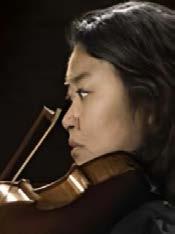
and culture, I know that I will continue to learn more each and everyday about who I am and what I truly value to be a proud Asian American.
4 Asian American Certificate Program News
Ella Barribeau Music Education and Asian American Studies Student.
Raising Funds for Asian American Studies
In just three weeks, the Asian American Certificate Program (AACP), with the help of 46 generous donors, was able to obtain its goal and raise a total of $5,565 during the NIU crowdfunding event held Feb. 16 to March 8, 2023. The amount exceeded the initial goal of $5,000. Most of the donors were from Illinois. Other monetary gifts were also received from Virginia, Ohio and Georgia in the U.S., and internationally from Taiwan and Singapore.
With the fifth-largest population of Asian Americans, Illinois is the first state in the U.S. to require Asian American histories be taught in public schools with the Teaching Equitable Asian American History Act (TEAACH Act) which went into effect Jan. 1, 2022. With this, the AACP has lead the NIU community in preparing our Huskies for the knowledge and skills needed in their careers to better serve the fast-growing Asian American population in the nation. Launched in 2003, the program has continuously provided students with a strong sense of the
Asian American experience and its impact on individuals, communities and the nation. The scholarship investment will therefore be used to meet the needs of our growing student body and expand its course offerings to enrich our students’ education regardless of their background and cultural heritage.
Our AACP Undergraduate Student Scholarship is still accepting donations through the NIU Foundation’s “Donate Now” page ( https://foundation.myniu.com/give.php).
Our ultimate goal is to raise $50,000 for Asian American Studies at NIU. A link in our AACP website will also take you to the NIU crowdfunding page for updates. Our program hopes to use these funds to provide generations of students with the opportunity to learn about the Asian American experience. These funds will also be used to collaborate with other campus departments and centers, as well as recruit more Asian American high school and community college students to attend NIU.
Scan to donate.
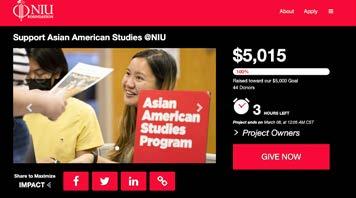
Asian American Certificate Program News 5
A Look Back at Featured Events
In fall 2023, Jen Shyu, a multilingual, multidisciplinary performing artist, brought her inspiring blend of creativity and activism to NIU campus through her talk and engaging workshops. Shyu’s residency became an icon of exploration and empowerment, encouraging participants to push their comfort zones and embrace the transformative power of self-expression. Reflecting on Shyu’s impactful visit, the NIU community feels energized, ready to use our voices as instruments of meaningful change. We are grateful to College of Visual Performing Arts, School of Music, Graduate Colloquium Program, Center for Southeast Asian Studies, Department of History, University Honors Program, and Asian American Resource Center for their support to make this event possible.
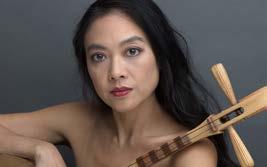
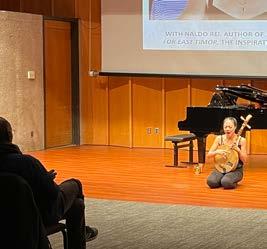
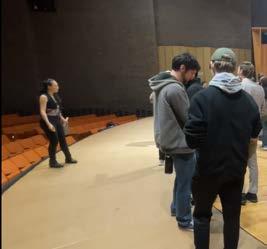
6 Asian American Certificate Program News
Nov. 30, 2023 lecture with Jen Shyu.
Nov. 29, 2023 lecture with Jen Shyu.
Right before spring break this semester, AACP Lecture Series has already provided the NIU community an exciting array of diverse discussions covering Asian American history and culture. Through presentations given by guest lecturers and NIU’s own faculty members, participants across academic disciplines have gained insights into special topics on Asian American studies that intersect with historical narratives, social justice, martial art culture, political landscape and linguistic perspectives.
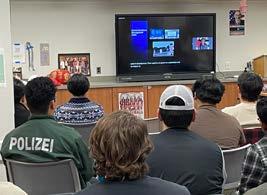
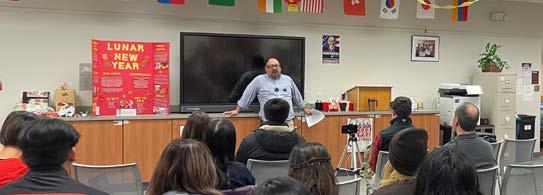
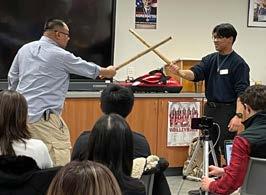
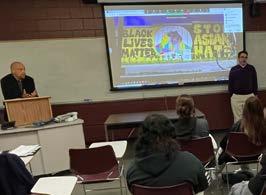
Asian American Certificate Program News 7
Jan. 30 lecture with A. Naomi Paik.
Feb. 20 lecture with Frank Delo Jr.
Feb. 20 lecture with Frank Delo Jr.
March 5 lecture with Taylor Atkins and Stanley Arnold.
A Look Back at Featured Events (continued)
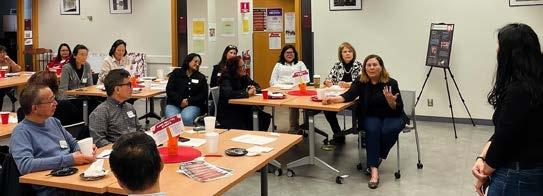
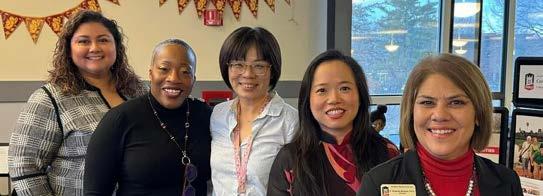
Jan. 30, 2024 “Guantánamo’s Travels: Empire, Imprisonment, Abolition” by Naomi Paik (Global Asian Studies and Criminology, Law and Justice, the University of Illinois, Chicago).
Feb. 20, 2024 “Harmony in Diversity: Navigating Identity through Music and Martial Arts” by Frank Delo, Jr.
March 5, 2024 “African American and Asian American Relations” by Taylor Atkins and Stanley Arnold (Department of History, Northern Illinois University).
March 19, 2024 “A Racial Theory of High-tech Innovation” by Huan He (Department of English, Vanderbilt University).
April 2, 2024 “Asian American Feminist Media-making” by Rachel Kuo (Department of Media and Cinema Studies, the University of Illinois at Urbana-Champaign).
April 9, 2024 “How Positionality Shapes Equity and Excellence in Higher Education” by Linh Nguyen (Department of Chemistry, Northern Illinois University).
8 Asian American Certificate Program News
Feb 8, 2024 Lunar New Year Luncheon at Neptune Dining.
Nov 16, 2023 Faculty-Staff Support Group Luncheon for faculty and-or staff who identify as Asian American Pacific Islander (AAPI), DESI, and-or Asian international.
Graduate Assistant Unboxing: Vianca Ocampo
I am a speech-language pathology graduate student, and one of the graduate assistants for the Asian American Certificate Program (AACP). Working as part of the AACP team has opened doors and enriched my busy life here at NIU as a graduate student. Having interacted with students in and off class and in various events on campus, not only am I able to develop my professional skills in communication, but I am also able to widen my perspectives and knowledge horizon outside of my own major field because of the highly interdisciplinary nature of Asian American studies as a new discipline. In addition, AACP has encouraged me to reach out and connect with the Asian American communities in and out of NIU. It has allowed me to practice cultural humility
and sensitivity in interacting with other individuals. Most importantly, AACP has encouraged me to become an advocate for Asian and Asian American communities, which is extremely important as an SLP, since I aim to work with clients from linguistically and culturally diverse backgrounds. I have enjoyed spending two years with the AACP team, and I look forward to seeing all the great things they accomplish in the years to come.

AACP course feature
Click here for fall courses. niu.edu/asian-american-certificate/program/courses.shtml.
Course: HDFS 384Asian American Families
This course provides an analysis of Asian American families using theories, methods and research findings. It has an emphasis on the process of immigration, family formation in the United States, family dynamics, family obligations and intergenerational relationship, interracial families, changing gender roles, marriage, identity formation, family and the life cycle, and family strengths. Students who take this course will learn to:
• Describe previous and current experiences of Asian American Families.
• Identify processes of immigration, acculturation and the transformation Asian American families.
• Understand family formation, family dynamics, family obligations, intergenerational relationship, interracial families, changing gender roles and the family life cycle in Asian American families.
• Identify the strengths and challenges experienced by Asian American families.
What requirements does this course meet?
• Human Diversity requirement.
• Required course for the Undergraduate Asian American Studies Certificate
Asian American Certificate Program News 9
Vianca Ocampo
Community Corner: Justice, Voice, Healing and Future: National Cambodian Heritage Museum and Killing Fields Memorial
By Justine Nham
In 1975, the Khmer Rouge regime took over the country of Cambodia resulting in four years of destruction for the lives of more than two million people. To escape the torture, hard labor, illness and starvation, Cambodian refugees fled the country eventually settling in the U.S. and other European countries. Soon after Cambodian refugees started arriving in Chicago in 1976, a group of Cambodians established the Cambodian Association of Illinois (CAI), which funded the Cambodian American Heritage Museum and the Killing Fields Memorial in 2004. Today, the CAI continues to provide services including senior in-home services, and children and youth educational programs for Cambodians and nonCambodians in the Chicagoland area. For the past 10 years, the Museum & Memorial has impacted the local and national Cambodian community as well as the public who come to visit. Considered a living museum, it has four interconnected focuses: justice, voice, healing and future. This living museum model serves as guide for the development and implementation of programs and activities. The “Remembering the Killing Fields” exhibition acknowledges the suffering and past experiences that Cambodians have gone through. The memorial builds hope for the future. The services and programs provided by the museum help the community to connect with the past and live in the present. Educational programs such as Khmer music, dance and language are offered throughout the year to help preserve and promote Cambodian culture in the U.S.
Every April, the museum exhibits the four focuses of justice, voice, healing and future in their observation of the Cambodian Day of Remembrance which “provides a platform for survivors, their families and the general public to come together to increase their awareness of the Cambodian genocide and its impact on the community, facilitate dialogues bridging generations, promote the role of art and creative engagement in healing, and facilitate youth leadership in social justice.”
The museum is open for individual and group tours to educate the public about Cambodian history and to share their experience with others. There
are many ways to support the museum through shared time and resources. For example, volunteer and internship opportunities are available not only to connect with the Cambodian community, but also to learn more about the Cambodian American experience and culture. Individuals can also donate or become a member to support the ongoing projects that meet the needs of the local Cambodian community and the mission of the museum to introduce Cambodian history and culture.
To learn more about the National Cambodian Heritage Museum and Killing Fields Memorial, please visit cambodianmuseum.org
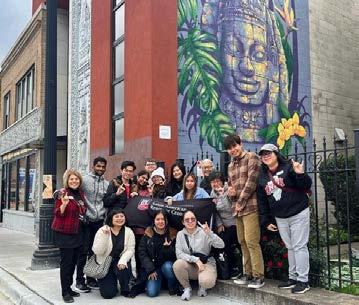
10 Asian American Certificate Program News
Educational Resource: Everyone Has a Story. Be Sure to Tell Yours!
By Justine Nham
For teachers seeking ways to implement Teaching Equitable Asian American Community History (TEAACH) Act in their classrooms, they can turn to books that reflect various cultural experiences of Asian Americans, as more Asian American authors have started to share their stories through writing for adults and children. Niphaphone Laura Robertson (formerly Sanavongsay) is one such example inspired to share her family’s refugee story from Laos.
Robertson discovered her family’s history when her husband asked to interview someone from another country like her for a class project. Agreed to participate, she learned she could not answer all the questions, so she reached out to her father who led her to discover their family’s refugee journey. Sharing this new knowledge about her family with a best-selling author who told her, “Everyone has a story. Be sure to tell yours,” Robertson felt encouraged to write her first autobiographical book “Forty Dollars and a Dream: Breaking Through the Bamboo Ceiling” in 2021. Two years later, she self-published “A Secret War Within Us: The Lao’d One Speaks” which tells the stories of struggle and resilience experienced by other Lao refugees. Seeing the need for Lao representation in children’s literature, Robertson self-published a children’s book, “Noy’s Journey to Belonging: A Quest for Courage” in 2023. Using her childhood nickname, “Noy,” Robertson, in this heartwarming picture book, recounts her experience leaving the refugee camps with her family for the U.S. with just $40 and a dream. (Her brother, Norrarak Sanavongsay is an NIU alumnus.) With the stories about Noy’s discovery of courage and belonging
in her new home in Elgin, Illinois, this book has quickly gained recognition in elementary schools and impacted students and teachers across the country. Initially, a fun project inspired by the book, Robertson created a Lao doll reflective of Noy’s character. Seeing the interest and demand for representation of Lao culture in dolls, she launched Lao Dream Dolls using handcrafted dolls with traditional Lao outfit to advocate
inclusivity and belonging. She even created a collection of cousin dolls inspired by her family members to show a blend of Lao heritage with other ethnic groups in the U.S.
Robertson is also a certified coach, speaker and trainer available for school visits and speaking engagements. For more information about Robertson and her books, visit her website: laura-robertson.com ; for Lao Dream Dolls, visit laodreamdolls.com
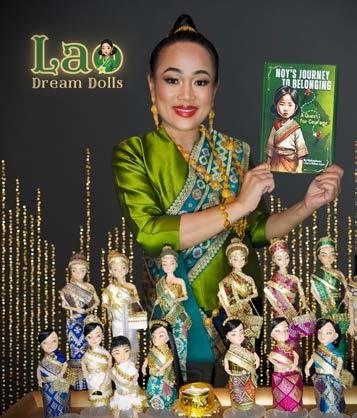
Asian American Certificate Program News 11
Stay Connected!
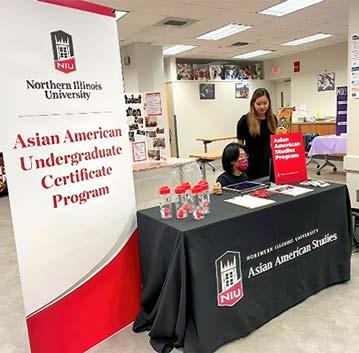


If you would like to sign up for our AACP newsletter, please contact aacp@niu.edu to be added to our AACP email list.
For more information about AACP, contact Chih-I Hsiao chsiao1@niu.edu, Vianca Ocampo vocampo1@niu.edu or or Justine Nham, jnham1@niu.edu.
12 Asian American Certificate Program News





















